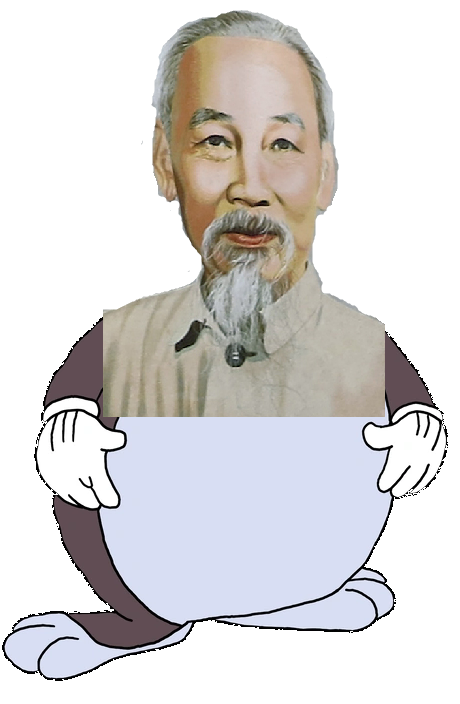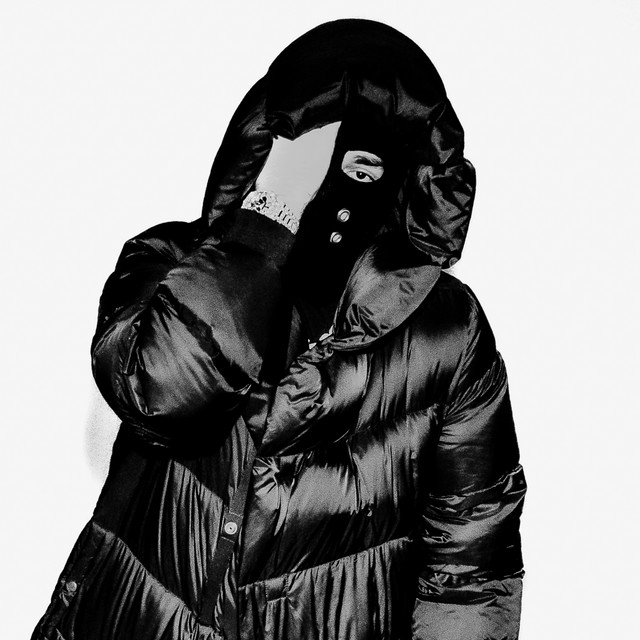the main poem you keep comin' back to
Lenin walks around the world.
Frontiers cannot bar him.
Neither barracks nor barricades impede.
Nor does barbed wire scar him.Lenin walks around the world.
Black, brown, and white receive him.
Language is no barrier.
The strangest tongues believe him.Lenin walks around the world.
The sun sets like a scar.
Between the darkness and the dawn
There rises a red star.-Langston Hughes

I think somebody on the old subreddit once spoofed it and it stuck with me so being a community based around traditions I'd figure I'd share
Lenin walks around the world,
his hog swings side to side,
it's unimaginably huge,
it's almost breadloaf wide
No man is an island entire of itself; every man is a piece of the continent, a part of the main; if a clod be washed away by the sea, Europe is the less, as well as if a promontory were, as well as any manner of thy friends or of thine own were; any man's death diminishes me, because I am involved in mankind. And therefore never send to know for whom the bell tolls; it tolls for thee.
Olde English Version No man is an Iland, intire of itselfe; every man is a peece of the Continent, a part of the maine; if a Clod bee washed away by the Sea, Europe is the lesse, as well as if a Promontorie were, as well as if a Manor of thy friends or of thine owne were; any mans death diminishes me, because I am involved in Mankinde; And therefore never send to know for whom the bell tolls; It tolls for thee.
Double space after each line to get a break, like
so. (It's weird and I almost never get it right)Wait it's possible to format correctly?
Testing
Testing
123
WHATTTTTTTTTT
Brecht's "To Those Born Later"
My favorite (and by favorite I mean hardest hitting) bit:
What kind of times are they, when
A talk about trees is almost a crime
Because it implies silence about so many horrors?
That man there calmly crossing the street
Is already perhaps beyond the reach of his friends
Who are in need?It is true I still earn my keep
But, believe me, that is only an accident. Nothing
I do gives me the right to eat my fill.
By chance I've been spared. (If my luck breaks, I am lost.)They say to me: Eat and drink! Be glad you have it!
But how can I eat and drink if I snatch what I eat
From the starving, and
My glass of water belongs to one dying of thirst?
And yet I eat and drink.He wrote this in the context of 1930s Germany, and it feels awfully current.
This one from Brecht is great too
A Worker Reads History
Who built the seven gates of Thebes? The books are filled with names of kings. Was it the kings who hauled the craggy blocks of stone? And Babylon, so many times destroyed. Who built the city up each time? In which of Lima's houses, That city glittering with gold, lived those who built it? In the evening when the Chinese wall was finished Where did the masons go? Imperial Rome Is full of arcs of triumph. Who reared them up? Over whom Did the Caesars triumph? Byzantium lives in song. Were all her dwellings palaces? And even in Atlantis of the legend The night the seas rushed in, The drowning men still bellowed for their slaves.
Young Alexander conquered India. He alone? Caesar beat the Gauls. Was there not even a cook in his army? Phillip of Spain wept as his fleet was sunk and destroyed. Were there no other tears? Frederick the Great triumphed in the Seven Years War. Who triumphed with him?
Each page a victory At whose expense the victory ball? Every ten years a great man, Who paid the piper?
So many particulars. So many questions.
Maybe it's a cliche but I think about that one poem about the two headed calf a lot
I couldn't name a main favorite, but there are some lines that stick with me. Like:
"You shall love your crooked neighbor/With your crooked heart." This line has been important to me for a long time.
As I Walked out One Evening by W.H. Auden
As I walked out one evening,
Walking down Bristol Street,
The crowds upon the pavement
Were fields of harvest wheat.And down by the brimming river
I heard a lover sing
Under an arch of the railway:
‘Love has no ending.‘I’ll love you, dear, I’ll love you
Till China and Africa meet,
And the river jumps over the mountain
And the salmon sing in the street,‘I’ll love you till the ocean
Is folded and hung up to dry
And the seven stars go squawking
Like geese about the sky.‘The years shall run like rabbits,
For in my arms I hold
The Flower of the Ages,
And the first love of the world.’But all the clocks in the city
Began to whirr and chime:
‘O let not Time deceive you,
You cannot conquer Time.‘In the burrows of the Nightmare
Where Justice naked is,
Time watches from the shadow
And coughs when you would kiss.‘In headaches and in worry
Vaguely life leaks away,
And Time will have his fancy
To-morrow or to-day.‘Into many a green valley
Drifts the appalling snow;
Time breaks the threaded dances
And the diver’s brilliant bow.‘O plunge your hands in water,
Plunge them in up to the wrist;
Stare, stare in the basin
And wonder what you’ve missed.‘The glacier knocks in the cupboard,
The desert sighs in the bed,
And the crack in the tea-cup opens
A lane to the land of the dead.‘Where the beggars raffle the banknotes
And the Giant is enchanting to Jack,
And the Lily-white Boy is a Roarer,
And Jill goes down on her back.‘O look, look in the mirror,
O look in your distress:
Life remains a blessing
Although you cannot bless.‘O stand, stand at the window
As the tears scald and start;
You shall love your crooked neighbour
With your crooked heart.’It was late, late in the evening,
The lovers they were gone;
The clocks had ceased their chiming,
And the deep river ran on.Something about "Miniver Cheevy, child of scorn" just sounds perfect to me. That line is burned in my memory for some reason. Also the rest of the poem makes me think of people with Roman statuary as their profile pictures.
Miniver Cheevy by Edwin Arlington Robinson
Miniver Cheevy, child of scorn,
Grew lean while he assailed the seasons;
He wept that he was ever born,
And he had reasons.Miniver loved the days of old
When swords were bright and steeds were prancing;
The vision of a warrior bold
Would set him dancing.Miniver sighed for what was not,
And dreamed, and rested from his labors;
He dreamed of Thebes and Camelot,
And Priam’s neighbors.Miniver mourned the ripe renown
That made so many a name so fragrant;
He mourned Romance, now on the town,
And Art, a vagrant.Miniver loved the Medici,
Albeit he had never seen one;
He would have sinned incessantly
Could he have been one.Miniver cursed the commonplace
And eyed a khaki suit with loathing;
He missed the mediæval grace
Of iron clothing.Miniver scorned the gold he sought,
But sore annoyed was he without it;
Miniver thought, and thought, and thought,
And thought about it.Miniver Cheevy, born too late,
Scratched his head and kept on thinking;
Miniver coughed, and called it fate,
And kept on drinking."My forebears forebore this way, in company." This is a poem that I keep coming back to, year after year. (CW: suicide)
Chosen Blindness by Mary Karr
I was blind to flowers for one thing.
Picture a meadow stitched with dandelion,
those seed stalks whose tall white headspoke up like ancestral ghosts
(pale auroras of wisdom), but profligate,
the fluff shot through with brown seedsthat others might follow. I never saw it,
just fixed on my own death, sat on the sofa
ingesting poison, looked outat the rectangular field as if it were a postcard
from some foreign land, useless, already cancelled.
I sucked streams of gray smoke down my lungsto blacken me deeper. The embroidery sampler I did in x’s
read BAD NEWS. The butterless popcorn I ate
was a bowl full of spiders. Skinny?My skeleton forced itself forward. No word
of praise passed my lips though a million breaths
moved through me. That’s what human bodies do, keepbreathing, no matter the venom their brains manufacture.
Now I go to church. Who’d think it?
We stand in rows, like graves, I’d once have thought,
like herd beasts lined up for slaughter. Now I noticeour bodies bend in the same places. We form the same angles.
To sing together, we have to breathe in unison,
draw the same air into the dark meat of our bodiesas if it actually were spiritu sancti and ourselves
that spirit incarnate. Every now and then,
a toddler bolts up the main aisle, pursuedby a lumbering adult. Babies list
in sloping arms and toothless grin.
The old lean on canesand chrome walkers set down slow. People
pause to let them pass. Always a list of dead is read,
always the sick are mentioned so your own achesseem aggressively minor. My forebears
forbore this way, in company. Bread fed them,
and they had to practice hope to keepplowing up the Dust Bowl’s
starved earth in rows, year
after fruitless year, till the cotton came back.At the end of my drinking,
I coiled a garden hose in the back of my station wagon
and set off driving to a towncalled Marblehead to breathe in the cool
exhaust and thus stop thoughts from streaming
through my mind like bad current.I’d left my infant son a note, glowing green
on my computer screen, how he’d be
better off. Now a column of sunthrough high windows shines
on his blonde head. His hand
holds half our hymnal, index fingerunderlining each word as we struggle
to match up our voices, hold the beat,
find the pattern emerging, feel the lightthat glows in our chests, keep it going.
Somebody already mentioned "Dulce et Decorum Est," which is also one that stuck with me. "The Tyger" by William Blake also has some imagery that's burned in my memory. I think I have Bill Waterson to thank for my first introduction to that one. I've already given an Auden example, but "The Shield of Achilles" is another one by him that I love. Emily Dickinson is also a favorite, and really I could just keep listing so I'll stop now.
Most hated poetry: Edmund Spencer was a war criminal whose cruelty is still remembered, but also he can never be forgiven for writing The Faerie Queene and I'm glad he died before he could finish all 12 books.
I like Elizabethan poetry too, but the faerie queene is a slog. It's been over a decade since I read it, so the details are fuzzy. I remember being bored out of my skull and becoming annoyed by the entire style of the thing--it is just. so. long. This is just my opinion though, so don't let me stop you. There are people who spend their careers studying it, so my opinion can't be universal. If you're interested, you should definitely give it a shot and see if you like it. It's not like you have to keep going if don't want to. Dip a toe in and see how it goes. There's a lot of symbolism and references in the piece, so you may want to find a good reference companion, or a very annotated edition. Or since you're reading for pleasure and not for a class, that may not matter anyway. If you do end up reading it, let me know what you think.
i’m not super knowledgeable about poetry but a lot of richard silken’s work like scheherazade and you are jeff have resonated with me and i can’t really explain why
Brecht - From A German War Primer
Glad to see other Brecht fans in the house
A one-l lama, he's a priest
A two-l llama, he's a beast
And i would bet a silk pajama
There isn't any three-l lllama
-Ogden Nash
the english translation really doesn't do it justice, but...
You oughn't abide, sitting calm in your home
Saying: Dismal it is, poor they are, and alone
You cannot permit it! You dare not, at all.
Accepting that outrage on all else may fall!







